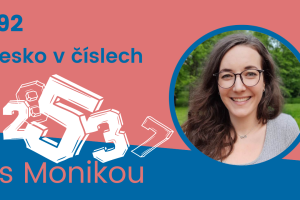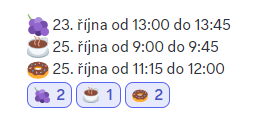
VIDEO: Czech & Pop-culture #1 : famous movies quotes in Czech
Video ze série “Czech culture” je tady! Filmové hlášky… ale co říkáme česky?
Tag:eliska
No products in the cart.

Video ze série “Czech culture” je tady! Filmové hlášky… ale co říkáme česky?
Tag:eliska


Not a member yet? Register now
Are you a member? Login now
Not a member yet? Register now
Are you a member? Login now

I’m Daniela or Danča. I enjoy working with adults from different cultural backgrounds. To me, Czech is like a beautiful forest that we explore together. Let’s play games, discover new strategies, and share our hobbies in class. I love traveling, swimming, reading, watching films, and singing in a vocal band.

I am slowczech courses manager and a Prague-based Czech tutor. Let’s conquer language fears together! I know how to tailor our lessons and ask you about your goals. Is it chatting over beer, work emails, university studies, family connections? I adore languages, plants, sitcoms, books, documentaries, ping-pong, and nature trips.

I’m Monika, or Monča, slowczech event & good mood manager. I love meaningful conversations and meeting new people. Languages and cultures are my passion. I was living in France, England and Vietnam. As a Czech tutor, I focus on understanding your needs and creating a positive, supportive environment.

I’m the slowczech tutor and e-shop manager living in Brno. Having lived in Spain and Russia, I love travelling – exploring new places brings me joy. I cherish the variety and surprises that life offers. Teaching allows me to embark on adventurous journeys with my students. Let’s discover the world together!

I’m creative content manager and tutor from Ostrava. As a tutor, translator, and course coordinator, I understand that every student is unique and requires a personalized approach. Whether you’re refining grammar or starting from scratch, I will help you. I incorporate real-life materials. Seeing your progress brings me joy!

I’m Marie, your friendly tutor and slowczech network & lab manager. I love connecting with students, fostering love for learning, and indulging in some Czech language nerdiness. I’m a Prague native, and I also love getting out of the city to hike and explore. Podcasts, British comedy, DnD, and spending time with my cat!

I am technical coordinator of slowczech content and tutor for children. I have been working with children since ever and there is no better job! In lessons love using stories, games and pictures. We always laugh a lot. Besides teaching, I enjoy meditation and spending time outside.

I’ve been teaching Czech since 2013, starting with native speakers and later focusing on Czech as a foreign language. It’s my calling to help you with this awesome language. In my classes, we play games, explore idioms and enjoy observing progress. Let’s talk books, movies, dogs, sun in our lessons!

I’m Barbora, or Bára. Life is amazing with wonderful people, my husband and my child by my side. I’m lucky to have my dream job, helping people understand each other. I enjoy both learning and teaching. I love working on conversation skills and correct pronunciation. Share your stories with me!

I’m Ema (or Míša), and I fell in love with teaching Czech eight years ago. Learning a language is a journey and I am here to be your guide and help you to enjoy it. Together, we always set a destination (in a week/month/year) and create a detailed itinerary, so we don´t get lost on the way. I love travelling, hiking, yoga, music, and dancing. I have a little baby now. That’s why I also offer WhatsApp and Hybrid lessons.

大家好!I am Lee, an experienced foreign language teacher. My background includes teaching students of all levels. I always listen to my students’ concerns, and I help them unlock their full potential. It really brings me joy to see my students make progress. Let’s get the ball rollin’! 加油加油

Since 2017, I’ve been teaching Czech to both groups and individuals. I tailor lessons to my students’ preferences, offering exam preparation or fun conversational classes. I believe that language connects us and fosters understanding. I’m also a certified teacher for children and have extensive experience working with kids.
Díky, že ses přidala do slowczech network! Do balíčku předplatného jsme zabalili opravdu spoustu funkcí. Pojďme je společně prozkoumat.
Na této stránce najdeš:
Věděla jsi, že ilustrace níže je Magion I, první československá družice?


I started teaching in 2013 as a volunteer in a Czech village in Ukraine. After teaching in Ukraine and Canada, I joined slowczech full-time. I focus on conversation lessons. I really enjoy getting to know my students! I’m passionate about protecting the environment and volunteer for ecological organizations.

I’m one of the lucky ones whose hobby is their job. I’ve learned ten foreign languages so far, and I’m currently learning German. I understand the challenges of learning Czech, but the feeling of finally getting it is incredible. I love traveling, reading books and spending time outdoors.

I’m enthusiastic Czech tutor and Spanish interpreter. Tolerance, positive mind, joy and respect are priorities for me – in lessons and in life. I spent some time abroad and I also study languages, so I can understand your needs. I am fascinated by interpersonal relationships, human mind and wonders of nature.

I’m Anna or rather Anička, and since 2019 I’ve been teaching Czech with a focus on interesting and entertaining methods. I prioritize conversations and dialogues to help students understand how the languages work. I aim to create a nurturing environment for you. Let’s start this wonderful language journey together!

I´m freelance tutor since 2019 currently living in Mexico. I use mostly communication methods of teaching, which means we will talk a lot. I believe language lessons are not only about learning a new language, but it is a great opportunity to explore different culture, meet new people, make friends!

I am constantly looking for playful and unconventional ways of teaching. I understand the Russian soul and speak Russian myself at a native level. I can help Russian speakers avoid the pitfalls that come with the similarities between 2 languages. I am not afraid to sleep alone in the forest.
... and receive information about slowczech courses and product offers, tips on how to learn Czech, good ressources, events we organize and much more.
Check your e-mail now (Promotion and Spam folders, too) to confirm your interest.
Mimochodem, tomorrow you will receive a little gift. 🎁
The videos and podcasts from slowczech Lab complement the free version. You can find them in the respective posts, located in the red section, as shown in the image below.

Thank you again for joining the slowczech Lab! We’ve packed as many features as we could into this subscription, so there’s a lot for you to explore.
On this page, you’ll find:
Interesting tidbit: the illustration below depicts a “táborák”, a beloved tradition in Czechia. Friends and families gather around a campfire to relax, chat, grill buřty, and sip beer.
With slowczech, we aim to provide you with a similar atmosphere: a warm, welcoming space to meet fellow learners and practice your Czech in a no-pressure setting. Enjoy! :)

You have the opportunity to enroll in 2 groups lessons per month.
The standard break down is between beginner and advanced students
The decision of the day and time of the lessons is based on a voting system held in Discord.
We will do our best to accomodate everyone!


I am slowczech founder and from my experience I know two things: beginners can understand words with time. And enjoyable input is vital for natural language acquisition. Many give up Czech due to old methods, irrelevant vocabulary or overwhelming grammar. Let’s change that and make learning Czech exciting and effective.
8 Comments
Ahoj Eliško, Všechno nejlepší k svátku. (Pardon my English.) In the Forrest Gump quote, his mother did not mean that Forrest didn’t know the content of a chocolate box, but that one didn’t know the content, right? Does the Czech verb 》víš《 have that generic meaning?
Ahoj ahoj,
Děkuji za přání, jsi moc hodný, že na mě myslíš 🙂
Víš means to know, like in English. Do you know what you’re gonna do tonight? Víš, co budeš děláš dnes večer?
But the point here is that she is saying ‘nikdy nevíš, co ochutnáš’ = you never know what kind of flavour/liquor/chocolate/nuts…are inside the piece of chocolate. It’s always a surprise (well, except for Merci chocolates where you can see the flavours names written on every piece of chocolate).
But I believe, this is what his mum meant in English, as well: you never know what kind of flavour (inside filling) you are gonna get. Nikdy nevíš, co ochutnáš.
Does it make sense? 😅
Eliška
Květinářství u nás dnes měl před něj tvoje jméno.
To paraphrase that question: the English second-person pronoun “you” can refer to people in general (not just your (!) interlocutor), and I think that the “you” in the quote does that. Does the Czech second-person pronoun “ty” have such a function?
😀🎁 Květinářství mají vždycky pravdu!
To answer, now I understand. Yes, the function is the same 🙂 She is talking to both, Forrest and people.
Firstly, great video, thanks! Reaally cool content!
One small thing, you wrote, “nobody puts a baby in a corner” this isn’t quite right and it changes the meaning. The indefinite article “a” is not necessary before “baby” because this makes it sound like you are putting an infant in the corner. “Baby” is her nickname so it doesn’t need an article – just like a normal name wouldn’t need an article.
Thanks
Rich
Ahoj Rich,
díky moc za komentář. I am happy you liked this video 🙂
It was fun for me to shoot and I enjoyed it very much. And it was easy.
It was, however, a way more work for the editor. I will tell him about your comment, thank you, so that he can learn a new thing today as did I 🙂
Krásný den!
Zdraví, Eliška
Ahoj Elisko!
Jak se mate?
Vase video me vzdy bavi, dekuji moc! Ale tohle se mi opravdu libi. Je to zababa! Doufam, ze si to zopakujete 🙂 💖
Taco
Ahoj Taco,
Díky moc! Ano určitě, pro nás to je taky zábava a bude více videí a materiálů z (české) popularni kultury 🤩😎 Eliška